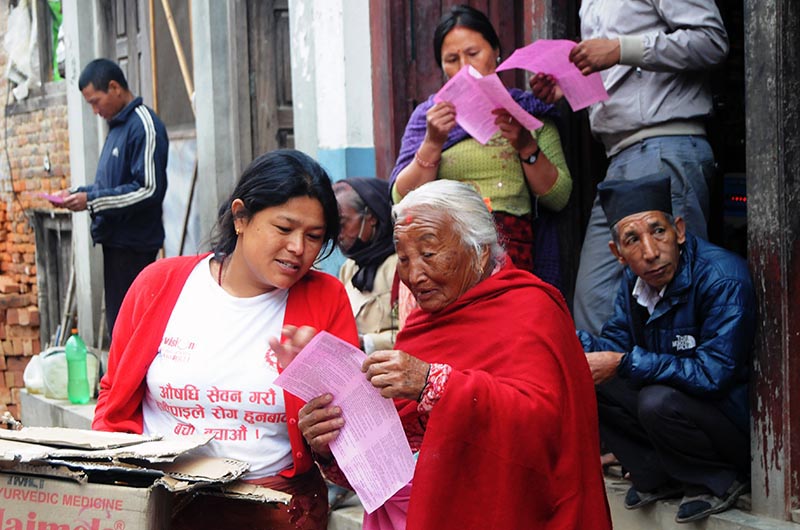Confusion reigns in PR voting as voters lack education
Kathmandu, December 7
Election officials at various polling stations across the Kathmandu Valley today said most of the voters were confused about how to cast their ballots under the proportional representation electoral system.
They said although voters did not face any such difficulty while voting under the first-past-the-post category, some of them were not sure how to fold PR ballot papers in a proper way before dropping them into ballot boxes. Polling officials said this has increased the risk of the ink getting smeared on the ballot paper, thus rendering them invalid.
At polling stations across the Valley, the voters could be clearly seen having trouble folding ballot papers as PR voting booths were jam-packed while voter queues moved ahead smoothly at FPTP booths.
The election officials attributed the problem to insufficient voter education programme and significantly long and confusing PR ballot papers. “This definitely raises chances of a high number of invalid votes,” said Sabita Dangal, polling officer at Padma Madhyamik Vidhyalaya-based polling station located at Bhaktapur Durbar Square in Bhaktapur Constituency No 1.
Dangal said in some cases voters even came over to election officials to ask which symbol they should vote on, which showed lack of voter education.
Bishnu Belbase, assistant polling officer at Bed Vidyashram polling station at Gaushala, which falls under Kathmandu Constituency No 4, expressed a similar view. It takes some time even for polling officials to tear a PR ballot paper from the deck and give it to voters because of its bigger size, he said. “This is why, PR voting takes longer than FPTP voting,” he said justifying the jammed queues at PR voting booths.
Voters said FPTP voting was comparatively easier than the PR system. Lila Sangat, 30, from Jay Bageshwori, on her way home after casting her vote at Bed Vidyashram-based polling station, said although she did not face any difficulty in FPTP voting, PR voting was quite confusing even after she had been told by poll volunteers and representatives of political parties how to cast vote in the right way.
Another problem faced by polling officials and voters alike was missing serial numbers of newly-registered voters. In some cases, voters themselves turned up at different booths, according to representatives of political parties present at the Cooperative Training Centre-based polling station at New Baneshwor in Kathmandu Constituency No 1.
Election officer of the station Suresh Neupane too admitted facing such problems. “The voting process has largely been smooth except for a few cases of confusion related to PR voting and serial numbers of voters,” he said.
Despite these setbacks, voters seemed quite enthusiastic and hopeful that the election would bring about political stability and development in the country. “The biggest problem our country is facing is frequent change of government,” said 90-year-old Tika Dutta Timilsena from New Baneshwor. “I have voted in almost every election held in the country, and I must say I have only been disappointed so far. But I am hopeful that leaders will now work for the people and the country’s development rather than for their own interests.”
Another voter from Bhaktapur, Ek Bhakta Twana, 91 who was found resting outside Padma Madhyamik Vidhyalaya-based polling station in Bhaktapur Durbar Square after casting his ballot, said he came to vote even though he was having some health issues in the hope that the elected representatives would now work for development of the country.






